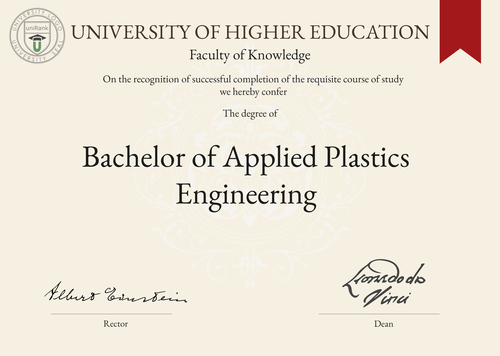
Bachelor of Applied Plastics Engineering (B.A.P.E.)
Guide to University Programs/Courses
Bachelor of Applied Plastics Engineering (B.A.P.E.)

Program/Course Name
Bachelor of Applied Plastics EngineeringProgram/Course Abbreviation
B.A.P.E.Duration Range
The duration of the program typically ranges from 3 to 4 years.Tuition range
The tuition fees for the program can vary depending on the chosen country or university. It is recommended to check with specific institutions for accurate information.Overview
The Bachelor of Applied Plastics Engineering program provides students with a comprehensive understanding of the principles and practices involved in the field of plastics engineering. Students gain knowledge in areas such as polymer science, material properties, processing techniques and product design.Curriculum Overview by Year
- Year 1: Introduction to Plastics Engineering, Mathematics for Engineers, Chemistry of Polymers, Materials Science- Year 2: Polymer Processing, Polymer Testing and Characterization, Thermodynamics, Engineering Mechanics- Year 3: Polymer Product Design, Polymer Rheology, Polymer Composites, Quality Control- Year 4: Advanced Polymer Processing, Polymer Recycling, Industrial Internship, Final ProjectKey Components
The key components of the program include theoretical knowledge, practical skills, laboratory work, industry internships and a final project. Students also have the opportunity to gain hands-on experience with various plastic processing techniques and equipment.Career Prospects
Graduates of the Bachelor of Applied Plastics Engineering program can pursue careers in industries such as automotive, packaging, medical devices, consumer goods and aerospace. Job roles may include plastics engineer, product development engineer, process engineer, quality control engineer and research scientist.Salary Expectations
The salary expectations for graduates of the program can vary depending on factors such as location, industry, job role and level of experience. It is advisable to research specific job markets for accurate salary information. For a more accurate understanding of salary expectations, you can utilize the Job Sites Search Engine, from our sister site jobRank, which searches over 4,600 job sites worldwide. Make sure to specify not only the job title but also the country you are interested in.Conclusions
It is important to note that the duration, tuition fees, curriculum, key components, career prospects and salary expectations of the Bachelor of Applied Plastics Engineering program can vary depending on the chosen country or location of study, as well as the chosen university. Prospective students are encouraged to explore different options and research specific institutions to find the best fit for their educational and career goals.Visitors interested in pursuing a Bachelor of Applied Plastics Engineering degree can use the uniRank World Universities Search Engine to find universities offering this program anywhere in the world.World Universities Search Engine
search for Bachelor of Applied Plastics Engineering (B.A.P.E.) and add the Location (country, state etc.) or specific University you are interested in studying at.
Query examples:
- Bachelor of Applied Plastics Engineering (B.A.P.E.) United States
- Bachelor of Applied Plastics Engineering (B.A.P.E.) United Kingdom online
- Bachelor of Applied Plastics Engineering (B.A.P.E.) Australia international students
- Bachelor of Applied Plastics Engineering (B.A.P.E.) University of California
- Bachelor of Applied Plastics Engineering (B.A.P.E.) University of London tuition fees
- Bachelor of Applied Plastics Engineering (B.A.P.E.) University of Sydney scholarships